AuthorOpener's 2nd bid #2 - rebidding his suit, bidding 2NT, or raising partner's suitThese bids are also unlimited (though the 2NT bid is a special case), continuing the description of opener's hand while establishing the foundation for the choice of games or for slam bidding. Let us take each possibility in turn. 1. Rebid of own suitThe rebid of opener's own suit can have any strength, and does not guarantee 6 cards in the suit. It is, indeed, the "default bid" whenever a hand does not fit any other bid. Some examples of minimum and maximum hands after the auction 1 Spade - 2 Clubs: Again, if you feel that 2 Spades is not enough with the 2nd hand, your instincts are in the right place. But there is no better bid. A jump to 3 Spades -- which will be discussed in the next article -- would require a better suit. There is no doubt you would have a lot of catching up to do once the bidding starts 1 Spade - 2 Clubs - 2 Spades, since partner will -- initially! -- picture you with something closer to the 1st hand We will discuss how to deal with that in a later article. What are the kinds of hands that rebid opener's suit with only 5 cards? It depends on responder's suit. The auction 1 Spade - 2 Clubs leaves space for opener to rebid any red suit at the 2-level; the auction 1 Spade - 2 Hearts preempts the minor suits, which must now be shown at the 3-level. Bidding at the 3-level requires extras -- either in distribution or in high cards -- and so opener may be stuck with a rebid in his own suit with a hand like the following one, after 1 Spade - 2 Hearts: This is a mild example. You could be forced to bid 2 Spades with a minimum 5-5! (It is a disgusting notion, and I try very hard to show the second suit, but some hands are so weak that I cannot bring myself to do it). What this all means is that the more space you have to bid new suits, the less likely it is that you will have a hidden suit when you rebid your own suit. 1 Spade - 2 Clubs is the best auction in that family: opener is denying 4+ diamonds or hearts, and so will only have 5 spades if his hand is inadequate for a 2NT rebid, to be reviewed shortly. On the other hand, 1 Spade - 2 Hearts is an auction in which the rebid is quite vague, and it will probably have only 5 cards more often than not, considering how 5-4 hands are so common. I haven't done the research to establish this, but you should take this rebid with a grain of salt anyway. 2. The 2NT rebidHere we have one of those bidding areas in which more than one style is popular and playable. Let me present each one in order: 2.1. 2NT shows extras In this style, 2NT shows at least a good 14+ hand (i.e., 2NT is one of the bids which require a non-minimum, just as all other 3-level new suit non-jump bids). With a hand weaker than that, you rebid your own suit, the default bid. Note some corollaries of this style:
2.2. 2NT shows a minimum (12-15) This gives better definition to the opener's rebid of his own suit (since it takes the balanced 12-15, with adequate stoppers, out of it). It is still not a guarantee of a 6-card suit there, since some hands will be quite inadequate for a 2NT rebid (imagine AKJxx xxx xxx KJ, 1 Spade - 2 Clubs - ?). But it increases the odds of catching those 6 cards. The corollaries are:
I honestly don't have any strong opinion on which is the best style. I have played both, effectively. Pick the one with which you feel most comfortable. If I had to make a guess about how an unknown partner would interpret it, I would go with the first option (2NT shows extras), but you should not have to guess. Discuss it with your partner! 3. A simple raise of partner's suitThis is unlimited, but the parameters change noticeably depending on whether partner`s suit is a minor or hearts (the only major suit that can be shown as a 2/1 response). Raising a minor suit shows extras (14+), and 4 cards in the suit, for two reasons: game in a minor requires more power, and responder can (and often will) have only 4 cards for his natural 2/1 response in a minor. On the other hand, responder always shows 5+ cards when he responds 2 Hearts over 1 Spade, and so opener may raise with 3. Also, opener may be minimum (and even subminimum!) with this raise, since raising a major suit takes precedence over any fine-tuning of strength. These are examples of minimum / maximum raises of a minor: Note that these auctions are often tricky. You should not pass (with the 2nd hand) when partner bids 3NT over your raise, but change one of your Aces (or even both of them) to Kings and the issue becomes less clear. That's the trouble with minor suits -- you have to take a chance (of bypassing the best contract, which is often 3NT) when deciding whether to explore a slam. The major suits are different in that you are not so interested in 3NT if you have found a fit there. (Though 3NT is often better than 4 of a Major...). This is why we raise hearts freely over the auction 1 Spade - 2 Hearts. Your hand can be like one of these, or anything in-between: It is easy to foresee difficulties if the same bid can have hands of such different playing power. We use some tools to help with slam bidding (Serious/Non-Serious 3NT, splinters rather than a direct raise, etc. All will be discussed at later articles.), but this is an area in which judgment will always be rewarded, and rote bidding can be harshly punished.
In the next article in this series (to be published next Monday, Jan 20th), we will finish the exploratory look at opener's first rebid.
0 Comments
Leave a Reply. |
Archives
September 2021
Categories
All
|
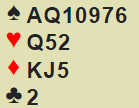
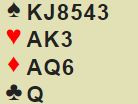
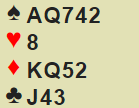
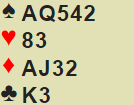
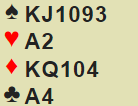
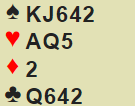
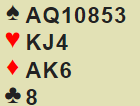
 RSS Feed
RSS Feed